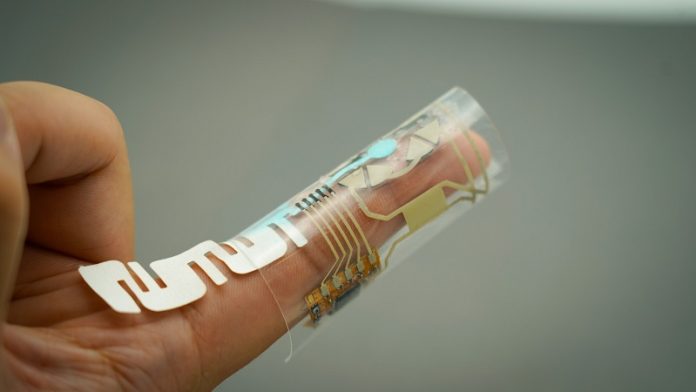
Imagine a tiny wearable device that can monitor your health using nothing but your sweat. Engineers at the University of California San Diego have developed a finger wrap that does just that.
This device can track important health markers, like glucose and vitamin levels, by using the sweat produced at your fingertips.
The best part?
It doesn’t need any external power source because it runs on energy from the sweat itself!
The research, led by Professor Joseph Wang and published in Nature Electronics, shows how this small device could make health monitoring as easy as wearing a Band-Aid.
Fingertips, surprisingly, are one of the sweatiest parts of the body, with thousands of sweat glands that can produce much more sweat than other areas—even when you’re resting or sleeping.
This steady supply of sweat provides a constant source of energy for the device.
The finger wrap is made from a stretchy, flexible material and is packed with tiny electronic components. These include biofuel cells that collect chemicals in sweat and convert them into electricity, which powers the device’s sensors.
There are four sensors in total, each designed to monitor a different health marker: glucose, vitamin C, lactate, and levodopa (a drug used to treat Parkinson’s disease).
The sweat flows through tiny channels in the device, which allows the sensors to measure the levels of these biomarkers. The data is then sent wirelessly to a smartphone or laptop app via Bluetooth, where users can check their health status in real time.
“This device makes health monitoring effortless,” said Shichao Ding, a postdoctoral researcher and co-first author of the study. “You don’t need to be active or even awake for it to work—it tracks your health while you go about your day.”
The device has been tested on a person who wore it throughout the day, tracking glucose during meals, lactate during exercise, and vitamin C after drinking orange juice.
The team is also working on a version of the device that could not only monitor health markers but also deliver treatments, such as insulin for diabetes patients, based on the data it collects.
The ultimate goal is to have a fully autonomous device that can monitor, power itself, and treat health conditions—all from a simple wrap around your finger.
If you care about health, please read studies about how Mediterranean diet could protect your brain health, and the best time to take vitamins to prevent heart disease.
For more health information, please see recent studies that olive oil may help you live longer, and vitamin D could help lower the risk of autoimmune diseases.



